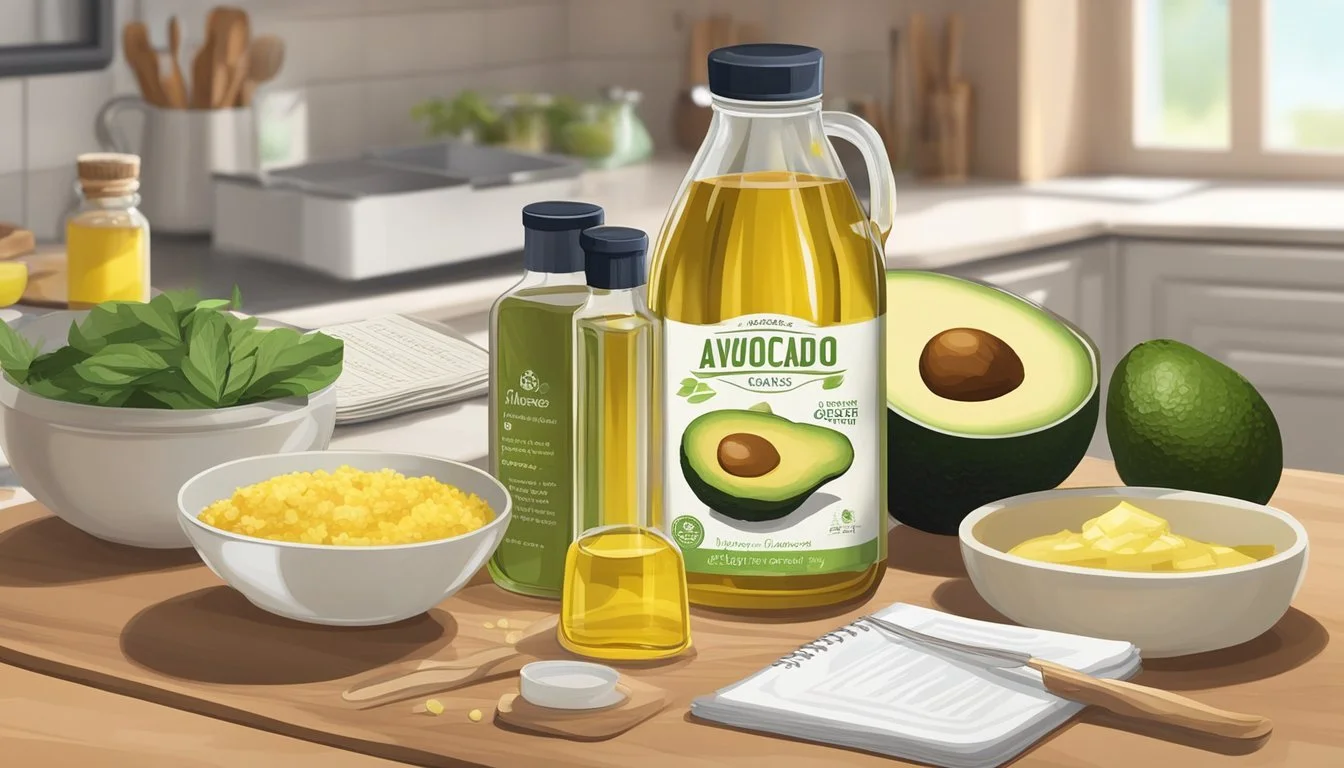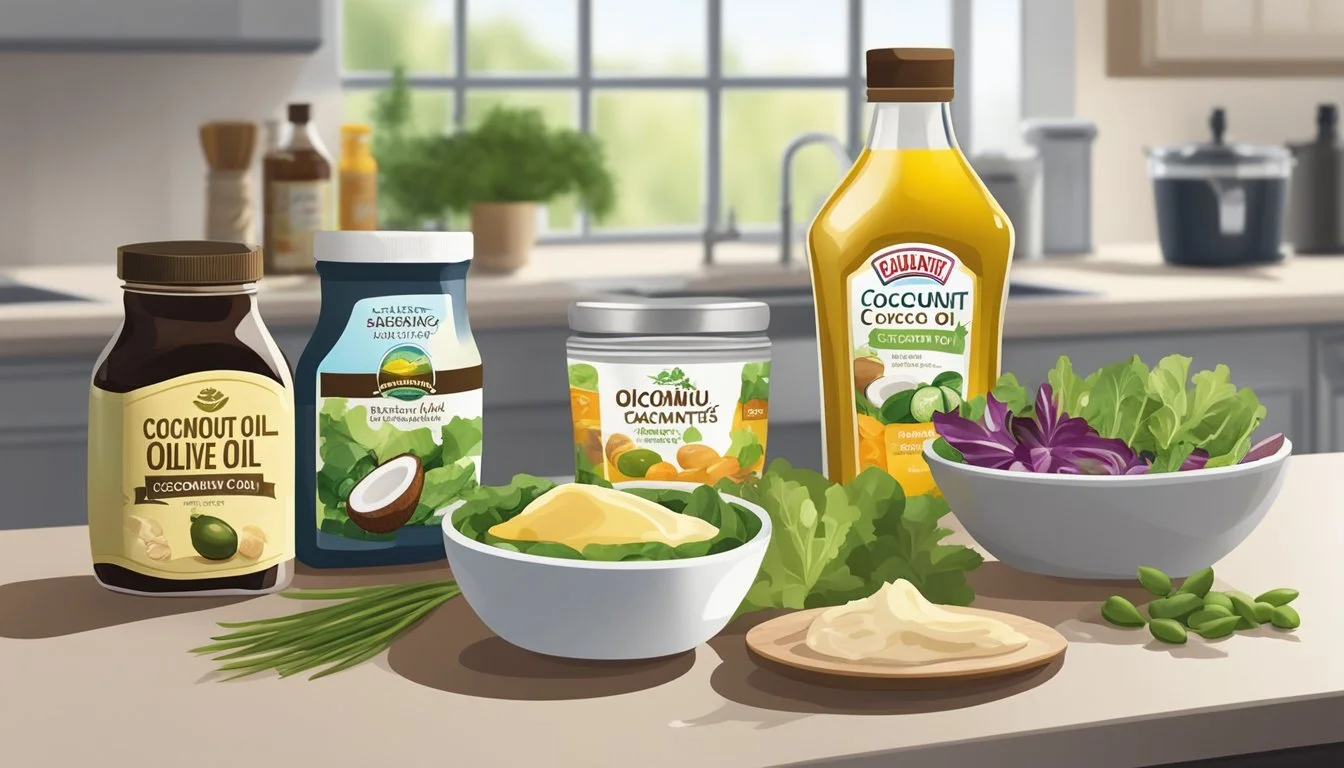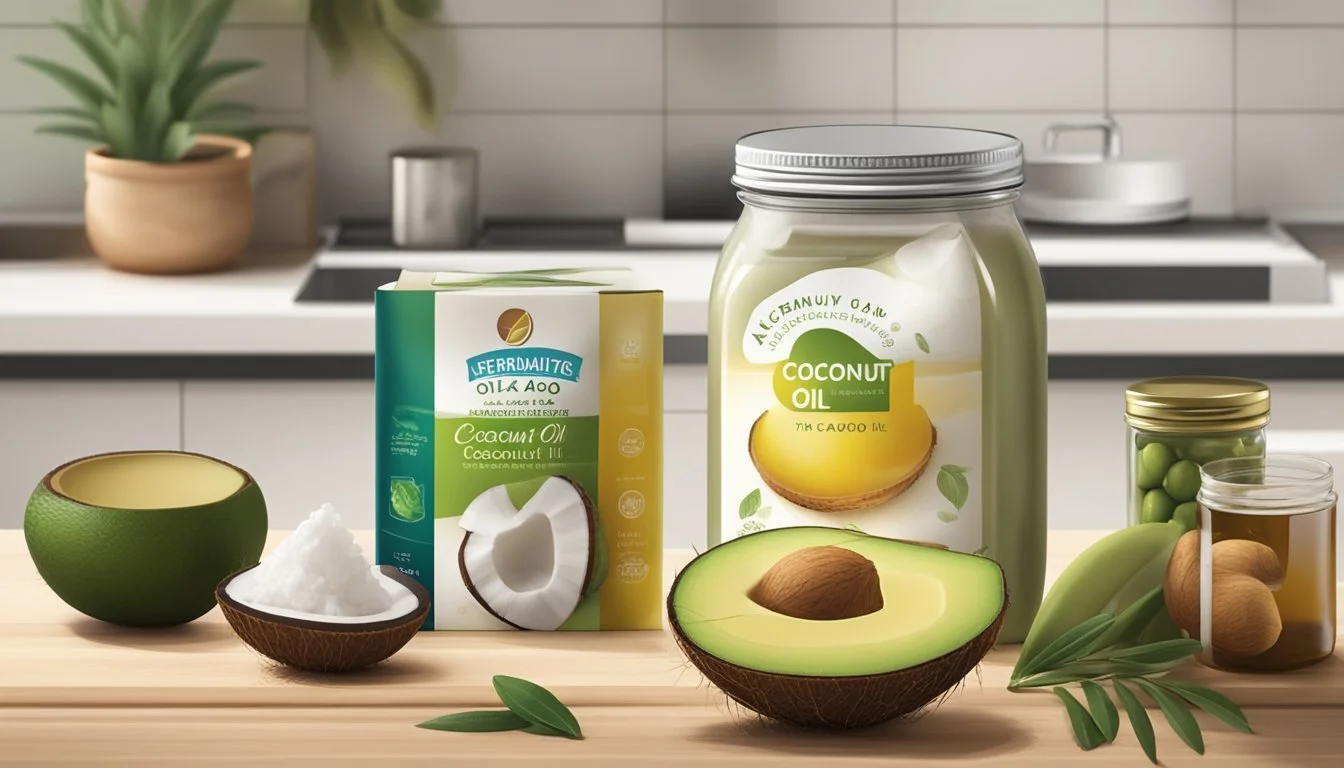Coconut Oil Substitutes
Top Alternatives for Baking and Cooking
Coconut oil has become a staple in many kitchens due to its unique flavor, versatility in cooking, and attributed health benefits. It's known for its medium-chain triglycerides (MCTs) and is often used in both sweet and savory dishes, as well as in baking, frying, and as a dairy-free alternative in vegan recipes. However, due to dietary restrictions, availability, or personal health considerations, some individuals seek out alternatives to coconut oil.
Identifying suitable substitutes for coconut oil depends on the intended use. For cooking at high temperatures, options like avocado oil and sunflower oil are preferred for their high smoke points. In baking, unsaturated fats such as olive oil and butter are often used interchangeably with coconut oil to achieve a similar richness and texture. Other substitutes, including almond oil and shea butter, cater to specific needs such as keto-friendly diets or skin care applications, respectively.
Understanding Coconut Oil
Coconut oil is renowned for its unique combination of fatty acids and flavor, making it a popular choice for culinary and health enthusiasts. This section delves into its distinct properties and implications for health.
Properties and Uses in Cooking
Coconut oil is extracted from the meat of mature coconuts. It possesses a high degree of saturated fats, which imparts to it a solid form at room temperature and a high smoke point around 350°F (177°C). This makes it stable for medium-heat cooking and baking. Its rich, sweet flavor is favored in vegan cooking, providing a dairy-free alternative to butter and other animal fats.
Common uses for coconut oil include:
Sauteing and stir-frying: Coconut oil remains stable at medium heat levels.
Baking: It is often used instead of butter for a unique flavor and texture.
Vegan recipes: Serves as a plant-based fat source that adds richness to dishes.
Health Considerations and Nutritional Profile
While coconut oil is healthy in moderation, it's predominantly composed of saturated fat, with about 87% of its fat content falling under this category. The high saturated fat content has sparked a debate among nutritionists regarding its impact on cardiovascular health.
Nutritionally, coconut oil offers:
Minimal vitamins or minerals.
Potential benefits linked to certain types of medium-chain triglycerides (MCTs) it contains.
A plant-based fat choice for those following vegan diets.
It is always advisable for individuals to consult nutritional experts to understand how coconut oil fits into their specific dietary needs, especially considering the ongoing discussions in the nutritional science community.
Substitutes for Cooking and Frying
When seeking substitutes for coconut oil, particularly in cooking and frying, it is crucial to consider both the smoke point of the oil and the flavor it imparts. These factors will determine the suitability of the replacement oil for high-heat cooking methods such as frying, grilling, and sautéing.
Oils with High Smoke Points
The smoke point of an oil is the temperature at which it begins to smoke and break down, potentially releasing harmful compounds and negatively affecting the taste of food. Therefore, for high-heat applications, it's important to choose oils with high smoke points.
Avocado oil: With a smoke point of approximately 520°F (271°C), avocado oil stands out as an excellent substitute for coconut oil in frying and grilling. Its mild flavor makes it a versatile choice for various dishes.
Canola oil: Offering a smoke point of around 400°F (204°C), canola oil is another good option. It has a neutral taste and is less expensive, which can be particularly appealing for everyday use.
Refined olive oil: While extra-virgin olive oil is renowned for its flavor, its smoke point is lower. Refined olive oil, however, carries a higher smoke point around 465°F (240°C), suitable for sautéing and frying without overwhelming the food's natural flavors.
Flavor Considerations for Heated Dishes
The flavor that an oil adds to a dish can be as critical as its smoke point, particularly in heated dishes where nuanced tastes become more noticeable.
Refined olive oil: It imparts a lighter taste compared to its extra-virgin counterpart and can complement a dish without dominating the flavor profile.
Canola oil: Its mild flavor assures that the original flavors of the ingredients are preserved, making it a flexible choice for a wide range of recipes.
Avocado oil: While neutral, it can still carry subtle notes of richness that may enhance the overall taste of a dish.
When replacing coconut oil, a chef must factor in both the cooking method and the desired flavor outcome to select the most appropriate oil.
Best Options for Baking
When baking, choosing the right substitute for coconut oil can affect the healthfulness, texture, and moisture of baked goods such as muffins, cookies, and cakes.
Healthier Alternatives for Baking
Applesauce: Applesauce stands out as a healthy substitute due to its lower fat content and natural sweetness. In baking, it's best suited for recipes where a subtle fruit flavor is acceptable. A direct substitute can be made in a 1:1 ratio, but it should be noted that it often works best in cakes and muffins rather than in recipes that require a crispy texture.
Butter: For those not restricted by dairy, butter provides a substitute that maintains the richness in flavor. It contains a blend of fat and water which contributes to its ability to provide added flavor and tenderness in baked goods. Butter can be replaced in equal amounts; however, the water content should be accounted for as it could slightly modify the texture.
Maintaining Moisture and Texture
Maintaining Moisture: The goal when substituting oils in baking is to retain the cherished moist crumb of cakes or the tender bite of cookies without adding an overwhelming flavor. Butter is a reliable option as it helps retain moisture due to its fat content, while applesauce adds moisture due to its high water content and pectin.
Texture Considerations: Texture is critical in baked goods. Butter will yield a slightly chewier texture and might add a delightful flavor due to the presence of milk solids. Applesauce, on the other hand, can make baked goods lighter in texture and is particularly useful for those seeking a lower-fat option. The key is to experiment with the quantities to ensure the final product suits one's preferences for specific baked goods like muffins and cookies.
Alternatives for Salad Dressings and Marinades
When replacing coconut oil in salad dressings and marinades, one must consider both the texture and flavor profile the substitute will bring to the dish. Ideal alternatives will complement the flavor of the salad ingredients and maintain the desired consistency.
Cold-Pressed Oils for Freshness
Extra Virgin Olive Oil (EVOO) and Sunflower Oil are excellent cold-pressed options that infuse dressings with a fresh and clean taste. EVOO, known for its richness, is typically used for its robust flavor profile, often pairing well with ingredients like balsamic vinegar and herbs. On the other hand, Sunflower Oil offers a milder taste and is lighter, making it a versatile choice for various salad dressings.
Extra Virgin Olive Oil:
Flavor: Robust, with a slight peppery note.
Best used in: Vinaigrettes, Mediterranean salads.
Sunflower Oil:
Flavor: Mild, almost neutral.
Best used in: Lighter dressings, mayonnaise.
Balancing Flavors in Dressings
The key to creating a harmonious dressing is balancing the flavor components. Substitutes like Grapeseed Oil excel in providing a clean canvas without overpowering the dish's other elements. Its neutral taste allows the primary ingredients to shine through. For a subtle, nutty flavor, oils like almond or walnut can be used, but these should be added with caution to ensure they complement, rather than dominate, the overall flavor profile of the dressing.
Grapeseed Oil:
Texture: Light and glossy.
Best for: Complementing without altering the flavor of delicate herbs and spices.
Nut Oils (Almond, Walnut):
Use sparingly to add a warm, nutty accent to your salad dressings.
Combine thoughtfully with ingredients that welcome a nutty undertone.
By choosing the right oil, one can maintain the integrity of the dish's flavors while offering a healthier alternative to virgin coconut oil in dressings and marinades.
Healthy Replacements for Special Diets
When considering dietary restrictions and preferences, such as veganism or heart health, it's important to choose coconut oil substitutes that align with these needs. These substitutes should cater to maintaining optimal cholesterol levels while providing essential fats like monounsaturated and polyunsaturated fats.
Vegan-Friendly Substitutes
For those following a vegan diet, baking without animal products doesn't mean compromising on flavor or texture. A prime consideration is saturated fats in coconut oil, which some seek to reduce.
Avocado Oil: High in monounsaturated fats and a good source of omega-6 and omega-9.
Safflower Oil: Known for its neutral flavor, it's high in polyunsaturated fats, ideal for baking and promoting better heart health.
Vegan baking can also benefit from natural, unprocessed oils that maintain the integrity of recipes while adhering to vegan principles.
Managing Dietary Restrictions
Individuals managing cholesterol levels or specific dietary restrictions benefit from oils rich in healthier fats that don't compromise taste. These include:
Olive Oil (Extra Virgin): A natural choice abundant in monounsaturated fats which can support heart health, but it has a low smoke point.
Hemp Seed Oil: Supplies a balanced ratio of omega-6 to omega-3 fatty acids and adds a nutty flavor to dishes.
Vegetable Oil: A collective term that often refers to oils like canola, providing lower saturated fat content and a high smoke point suitable for various cooking methods.
Choosing oils that align with dietary needs doesn't have to be complex. One can opt for oils with a balance of fatty acids that contribute to a nutritious diet, ensuring both health and flavor are paramount.
Unique Substitutes with Distinct Flavors
When opting for a coconut oil alternative, individuals seek flavors that complement their culinary creations without overshadowing them. Several oils deliver unique taste profiles that can enhance a dish with their distinct characteristics.
Almond Oil and Hazelnut Oil are notable for their nutty flavor, a characteristic cherished in gourmet cooking. Almond oil, with its subtle, sweet essence, is especially suited for desserts or drizzled over a Mediterranean salad. Contrarily, hazelnut oil offers a richer, more pronounced nutty taste, making it a delightful addition to baked goods or as a finisher for roasted vegetables.
Avocado Oil brings a creamy texture and a hint of butteriness that can elevate both sweet and savory dishes. Its high smoke point also makes it a versatile substitute in high-heat cooking methods.
Oil Flavor Note Best Used In Almond Oil Sweet, Nutty Desserts, Salad Hazelnut Oil Rich, Nutty Baked Goods, Roasts Avocado Oil Creamy, Buttery Sautéing, Frying
Meanwhile, for those who prefer a more neutral substitute, Sunflower Seed Oil is an excellent choice. It imparts minimal flavor, ensuring the original taste of the dish remains intact, and bears a likeness to the fatty profile of coconut while still being distinct.
In replacement of coconut oil, the chosen alternative should not only act as a functional equivalent but also complement the ingredients and the intended flavor profile of the dish. Each oil listed possesses unique characteristics that, when used judiciously, can turn a simple recipe into a standout meal.
Other Uses of Coconut Oil and Its Substitutes
Coconut oil is celebrated for its versatility in cooking and baking, but it also extends into personal care and the smooth operation of households and industries. This section will explore how its substitutes can serve similar multifunctional purposes.
Substitutes in Cosmetic and Skincare Products
Coconut oil is renowned for its moisturizing properties, making it a staple in skincare products. As a natural emollient, it's commonly found in lotions, creams, and lip balms. However, individuals may opt for alternatives due to allergies or personal preferences.
Shea Butter: Known for its rich, nourishing qualities, similar to coconut oil, shea butter is extensively used in skincare products. It is particularly beneficial for dry skin due to its vitamin-rich composition.
Neem Oil: With potent antibacterial properties, neem oil is a powerful substitute in skincare formulations, helping to combat acne and protect skin health.
These substitutes boast similar benefits to coconut oil, offering hydration and skin protection, and can be integrated into daily skincare regimens with ease.
Household and Industrial Applications
Beyond personal care, substitutes for coconut oil find their place in various household and industrial applications due to their unique properties.
Beef Tallow & Lard: These animal fats are valued for their high smoke points and are used in the manufacture of cooking sprays. Their stability during high-heat cooking makes them suitable substitutes for coconut oil in culinary applications.
Ghee: Clarified butter, or ghee, brings a rich flavor to dishes. It also has a high smoke point, making it a reliable substitute in cooking and a common ingredient for stabilizing shelf-stable foods.
Each alternative brings its own set of attributes to the table. Whether for personal care products or in maintaining an efficient home or business, these substitutes provide versatility comparable to coconut oil.
Selecting the Right Substitute
When choosing an alternative for coconut oil, several factors need to be considered to ensure the substitute aligns with the cooking or baking requirements. Substitutes should be matched based on the desired flavor, the smoke point for cooking, taste compatibility, potential health benefits, and whether they are cost-effective.
For replacing coconut oil in cooking, one should look for oils with high smoke points to handle similar cooking temperatures. Avocado oil and clarified butter are excellent choices in this regard. Avocado oil is particularly revered for its neutral taste and healthful fats.
Olive oil often serves as a coconut oil substitute, especially in dressings and low-temperature cooking. It comes in a range of qualities, with extra virgin olive oil known for its distinct taste and health benefits. However, its lower smoke point makes it less suitable for high-heat cooking.
In baking, unsweetened apple sauce can replace coconut oil for added moisture without the fat content. It is also a cost-effective alternative. For flavor, regular butter retains the richness in recipes, although it adds dairy into the mix, which might not be desirable for all diets.
Here's a quick glance at some common substitutes:
Substitute Best Used For Flavor Smoke Point Consideration Avocado Oil High-heat cooking Neutral High Healthful fats Olive Oil Dressings, low heat Distinct Low to Medium Flavorful Clarified Butter Frying, sautéing Rich High Dairy content Apple Sauce Baking Mild, sweet N/A Low fat Butter Baking Creamy, rich Medium Dairy content
Each alternative brings its own qualities to the table, and the choice of a coconut oil substitute will depend on the specific needs of the recipe and personal dietary preferences.







